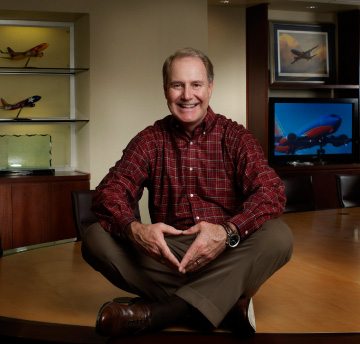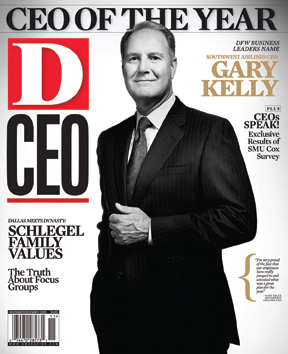Revenues through the first two quarters are down more than 8 percent. Hundreds of flights had to be dropped from the schedule. Three of the last four quarters operated at a loss. At press time, Wall Street was forecasting this year’s third quarter in the red. Expectations are that Southwest Airlines could lose money in 2009, ending a 36-year run of annual profits.
Yet the business leaders of Dallas have named Gary Kelly—president, chairman of the board, and chief executive officer of Southwest—as CEO of the Year. The votes were tabulated as part of the CEO Sentiment Survey 2009 conducted by the Cox School of Business at Southern Methodist University.
Kelly’s peers saw how well Southwest has performed compared to its industry rivals, most of which sustained revenue losses reaching the double digits in percentage terms. They saw that Southwest’s flight schedule changes—adding dozens of flights while trimming unproductive routes—led to profit in the second quarter. Though air traffic remains depressed in a sluggish economy and fuel prices are back on the rise, Southwest expanded—Minneapolis-St. Paul, New York LaGuardia, and Boston Logan joined the route map. Flights from Milwaukee were scheduled to begin Nov. 1.
Kelly says he’s honored to receive this distinction from his fellow CEOs. During an interview in his office at Southwest HQ, he gave credit for the company’s success to its 35,000 employees. In discussing what Kelly calls a “very difficult year,” we touched on the company’s bid to acquire Frontier Airlines (eventually lost to much-smaller Republic Airways), how Southwest comes out ahead by declining to collect checked baggage fees, and the Dallas-based airline’s future.
D CEO: So what kind of year has this been?
GARY KELLY: It’s been an incredibly challenging year. We celebrated 38 years back in June, and it’s easily the most challenging year we’ve ever had—the economy, fuel prices. We’ve had to make, for us, very significant adjustments, starting with our flight schedule. And everybody in the company has had to pitch in because everybody’s been affected by it.
You have a 36-year annual profit streak going right now. What’s the significance of a streak that long for an airline?
It’s enormously significant, and we haven’t given up on extending it this year.
You haven’t? You still think there’s a chance that could happen?
There’s definitely a chance. As long as there’s a day left in this year, there’s a chance. But it’s just been that kind of environment. The last time we lost money on an annual basis was 1972. No other airline comes remotely close to that record, and I’m sure it’ll never be matched.
Do you think the worst is behind you or still ahead?
I think the worst is ahead of us, from an earnings perspective. While I think the economy has stabilized this summer, so has our traffic demand, and our revenues have actually improved some. So, from that perspective, perhaps the worst is behind us, as best we can tell. But now fuel prices are high. So we’re doing fine at $50 a barrel in crude oil equivalence, but at $70 it’s very painful. It does really put prospects for profits in the fourth quarter and the first quarter in jeopardy.
So could there be many more flights trimmed from your schedule?
I hope not. I think if trends continue as they are, we’re pretty stable. We’re going to continue to work on improving the customer experience for the balance of this year and throughout next year. We have plans to introduce new products, new programs that should help support that goal. And if we can manage our fuel costs, then I think we have a decent chance of profitability in 2010. Of course, again, the economy is still very weak. I think demand for air travel is still somewhat tenuous. In particular the business travel segment is still very, very weak, and we have not seen a significant improvement there.
What were you hoping to achieve out of the Frontier Airlines acquisition, and are you still able to get that by expanding your services in Denver, as you have since the acquisition failed?
We were the underdog in terms of the auction process. Republic was the lead creditor in the bankruptcy situation, and once they decided to pursue a bid for Frontier, it made it very difficult for us to overcome them. They don’t have the Department of Justice challenges that we were facing. They were obviously planning to keep the Frontier name, the headquarters they were going to keep, all of the aircraft for the most part. So our bid was far more complicated. We were going to absorb them into Southwest Airlines, retire the Airbus [jets used by Frontier], be subject to Department of Justice review, and then finally just because we were going to integrate their company into ours, it brought a lot of cultural concerns to bear. Not the least of which was integrating labor union contracts. So they weren’t facing any of those challenges. I felt like we ended up at a very good place. It just wasn’t meant to be. It was just an opportunity for us to grow rapidly in one of our most rapidly growing markets. Denver’s been the fastest new market in our history and a tremendous success for us thus far. So we’ve overtaken Frontier in the market as the No. 2 carrier to the big dog in the market, which is United Airlines.
This fall you announced a $10 fee for early-bird check-in, and you eliminated lemons from flights, which of course got a lot of headlines. Does this signal the start of nickel-and-diming?
Well, we don’t nickel-and-dime, and don’t ever want to. We’ve got a very strong brand reputation. I think the marquee of the nickel-and-diming for us is the bag fee. And to the extent that we can offer our customers more, and offer them more choice, then I do feel that it is appropriate to charge for that. So early-bird fits in very cleanly with that. The vast majority of people don’t want to part with 10 bucks, and we don’t want to force them to.
Other airlines have raked in hundreds of millions of dollars more in revenue from the bag fees. So why not charge for bags?
I think that that analysis is flawed. I mean, there’s no question that airlines are collecting money for bags. But what is left unanswered in a story like that is how many customers choose simply not to fly because now the total cost of the trip is too high for them. Or they choose to move their business over to Southwest Airlines. No airline is performing better than Southwest—most are performing much worse. The thought that we could keep all the customers we have today, and add on a $15 bag fee on top of that, is ludicrous. We’ll lose a substantial amount of traffic, and the best evidence I can point to you is just look at our experience in 2008. We were forced to raise fares aggressively in 2008 because of skyrocketing fuel prices. In most months last year, at least beginning in the May-June time period, our traffic was down 10 percent. If we lost just 5 percent of our passengers, it would wipe out all the benefit of the bag fee. And that is not taken into account, in other words, when you see the stories about how much money is being collected for the bags.
Do you think Southwest is in a unique position though, because of the price sensitivity of your typical customer? Do bag fees make sense maybe for some of these other, legacy carriers?
Perhaps, but … more than ever, the industry is dependent upon more price-sensitive people. You’re right to say that that’s our customer set, but the only thing I’m challenging is I think it should be every airline’s customer approach. And the issue I have with [the bag fees] is, it hurts the people who are the most price sensitive. So if you’re a first-class business customer, you don’t have to pay the bag fee. It’s already in your fare. But if you’re the family of four who’s cobbled together all their money to take one trip a year and then they show up at the airport and they’re surprised with a couple hundred dollars of bag fees, that’s not right. And that’s just not what we stand for.
Any new destinations on the horizon?
Absolutely. I think that if you look at our financial performance, as I’ve said, we haven’t even given up on being profitable for the year. I’m very proud of the fact that our employees have really jumped in, and executed what was a great plan for the year, and then they’ve made excellent adjustments—audibles—we’ve called a lot of audibles this year. And I think that the results attest to that.
What’s an example of an audible this year?
Well, early-bird was an audible. Early-bird was not planned for this year. Neither were carrying pets on board. Boston Logan wasn’t planned for this year, and Milwaukee, of course, is an up-and-coming market. So I’m very proud of our people and how they’ve responded. It does put us in a position where we’re more confident about thinking about more new cities for next year; there’s a lot of cities that we’d like to add to the route map. Can’t tell you what those are. But stay tuned.






